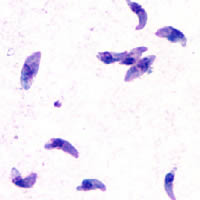Toxoplasmosis
Toxoplasmosis is a disease caused by the protozoan parasite Toxoplasma gondii, an apicomplexan. This infection is associated with various neuropsychiatric and behavioural conditions and is often asymptomatic in healthy adults.
However, it can lead to severe complications in immunocompromised individuals and during pregnancy.

Signs and Symptoms
Acute Toxoplasmosis: Often asymptomatic in healthy adults, but may present with flu-like symptoms such as swollen lymph nodes, headaches, fever, and muscle aches. Severe symptoms include encephalitis, seizures, poor coordination, and chorioretinitis, particularly in immunocompromised individuals.
Latent Toxoplasmosis: Generally asymptomatic, with the parasite entering a dormant phase forming bradyzoites within tissue cysts. These cysts can persist in the brain, muscles, and other tissues for the host's lifetime.
Skin Manifestations: Rarely, patients may develop skin lesions such as roseola, erythema multiforme-like eruptions, prurigo-like nodules, urticaria, and maculopapular lesions.
Diagnosis
Diagnosis is made using serological, histological, molecular methods, or a combination. Common tests include ELISA, IFA, and PCR. The Sabin-Feldman dye test remains the gold standard.

For Congenital Toxoplasmosis: Diagnosis involves testing amniotic fluid, placenta, and cord blood, along with serological surveys and clinical examinations.
Cause
T. gondii has a complex lifecycle, adopting forms like tachyzoites and bradyzoites. The parasite manipulates the host's immune response to enhance its survival and proliferation. Transmission occurs through ingestion of contaminated food or water, handling cat faeces, or congenital transmission.

Treatment
Acute Infection: Treatment includes pyrimethamine, sulfadiazine, and folinic acid. Spiramycin is recommended for pregnant women to prevent foetal infection.
Latent Infection: Cysts are resistant to standard treatments. Atovaquone and clindamycin have shown promise.
Congenital Infection: Early diagnosis and treatment reduce risks. Spiramycin is used if the foetus is uninfected, while pyrimethamine and sulfadiazine are used if the foetus is infected.
Epidemiology
T. gondii infections are widespread, with significant variation by country. In the UK, the seroprevalence among women of childbearing age is lower compared to regions like Latin America and parts of Europe.
Research and Societal Impact
There is ongoing research into the link between T. gondii and mental health conditions like schizophrenia, OCD, and suicidal tendencies. The parasite may also affect neurological disorders and increase the risk of traffic accidents due to impaired psychomotor performance.
"Crazy Cat-Lady Syndrome:" This term describes findings linking T. gondii to mental disorders and behavioural problems, although later studies did not confirm a strong causative relationship.
Notable Cases: Celebrities like Arthur Ashe and Martina Navratilova have been reported to suffer from complications related to T. gondii.
Other Animals
T. gondii infects virtually all warm-blooded animals. Infection rates vary widely among species and geographical locations. Australian marsupials and marine mammals like sea otters and Hawaiian monk seals are particularly susceptible.

Conclusion
Understanding toxoplasmosis is very important for medical professionals due to its widespread prevalence and potential for severe complications in certain populations. Comprehensive knowledge of its lifecycle, transmission, symptoms, diagnosis, and treatment options is essential for effective management and prevention.
Self-assessment MCQs (single best answer)
What is the causative agent of toxoplasmosis?
Which of the following is a common diagnostic method for toxoplasmosis?
Which form of Toxoplasma gondii is responsible for the chronic, latent infection?
What is the gold standard diagnostic test for toxoplasmosis?
Which medication is recommended for treating acute toxoplasmosis?
Which population is particularly at risk of severe complications from toxoplasmosis?
How is Toxoplasma gondii primarily transmitted?
Which of the following can be a skin manifestation of toxoplasmosis?
What is the recommended treatment for toxoplasmosis in pregnant women to prevent foetal infection?
Which of the following animals is particularly susceptible to Toxoplasma gondii infection?
Dentaljuce
Dentaljuce provides Enhanced Continuing Professional Development (CPD) with GDC-approved Certificates for dental professionals worldwide.
Founded in 2009 by the award-winning Masters team from the School of Dentistry at the University of Birmingham, Dentaljuce has established itself as the leading platform for online CPD.
With over 100 high-quality online courses available for a single annual membership fee, Dentaljuce offers comprehensive e-learning designed for busy dental professionals.
The courses cover a complete range of topics, from clinical skills to patient communication, and are suitable for dentists, nurses, hygienists, therapists, students, and practice managers.
Dentaljuce features Dr. Aiden, a dentally trained AI-powered personal tutor available 24/7 to assist with queries and provide guidance through complex topics, enhancing the learning experience.
Check out our range of courses, or sign up now!


